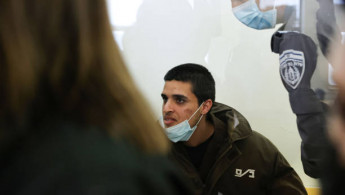#FreeAhmadManasra: Israeli court extends Ahmed Manasra's isolation for another 6 months
An Israeli court extended on Tuesday the solitary confinement of Palestinian prisoner Ahmad Manasra for another six months.
Manasra, who was arrested at the age of 13 in 2015, after being run over by an Israeli police vehicle and beaten on the head by Israeli settlers, suffers from severe psychological damage due to his arrest conditions, lack of treatment and isolation.
He was sentenced to 12 years, then lowered to nine, after being charged with assisting his cousin in an attempt to stab an Israeli in Jerusalem. His cousin was shot and killed on the spot.
Manasra will now remain isolated until November. His lawyer, Khaled Zabarqa, said that he will appeal the decision.
BREAKING: An Israeli court extended the solitary confinement of Palestinian prisoner Ahmad Manasra, 20, for another 6 months, despite the serious deterioration in his mental health.
— PALESTINE ONLINE 🇵🇸 (@OnlinePalEng) August 16, 2022
Manasra has been subjected to violence and torture since his arrest as a child 7 years ago. pic.twitter.com/Oco19k4PVA
"Ahmed is in a very difficult condition and he needs urgent treatment," Zabarqa told The New Arab on Tuesday. "The court's excuse to maintain Ahmed isolated is that he might hurt himself, but isolation only causes him more damage."
"I visited Ahmed recently and I know exactly how the isolation is affecting him, and though I can not give details due to professional secrecy, I can say that he needs professional treatment as of now," added Zabarqa.
"Ahmad has grown out of childhood and lived through his adolescence in Israeli prison, submitted to repeated solitary confinement," Yoaad Ghanadry, head of the Palestinian Mental Health Network who has been following Manasra's case, told The New Arab.
20-year-old Palestinian prisoner Ahmad Manasra, who was arrested at the age of 13, appears during his session court which was held today.
— PALESTINE ONLINE 🇵🇸 (@OnlinePalEng) August 16, 2022
Manasra is currently detained in the solitary confinement section of “Hashikma” prison in Ashkelon. #FreeAhmadManasra pic.twitter.com/ogmDuy98lj
"His latest solitary confinement has lasted for almost eight months, which seriously deteriorated his conditions and forced the Israeli authorities to transfer him to the Ramleh prison clinic," said Ghanadry.
On Saturday, Israeli jail authorities transferred Manasra to the isolation section in the Eishel prison in the Negev desert.
In April, the Palestinian Mental Health Network and other rights organizations and activists launched a campaign to gather support for Ahmad Manasra's case.
It is outrageous that the Israeli authorities have renewed Ahmad Manasra’s spell in solitary confinement. Continuing to detain Ahmad Manasra in such inhumane conditions is a callous act of injustice. Ahmad has been diagnosed with schizophrenia and is severely depressed. pic.twitter.com/mLeWfslpAj
— Amnesty International (@amnesty) August 5, 2022
In the same month, Manasra's lawyer filed a request for his early release because he had served more than two-thirds of his sentence and he was not charged with stabbing.
The Israeli court transferred the case to a special committee to decide whether to drop "terrorist" charges in his case, given his age at the time of the events and the fact that he was never charged with stabbing.
In June, the committee decided to reinstate the "terrorism" charges on Manasra, and his early release was refused.





 Follow the Middle East's top stories in English at The New Arab on Google News
Follow the Middle East's top stories in English at The New Arab on Google News
![Israeli forces ordered bombed Gaza's Jabalia, ordering residents to leave [Getty]](/sites/default/files/styles/image_330x185/public/2176418030.jpeg?h=a5f2f23a&itok=_YGZaP1z)

